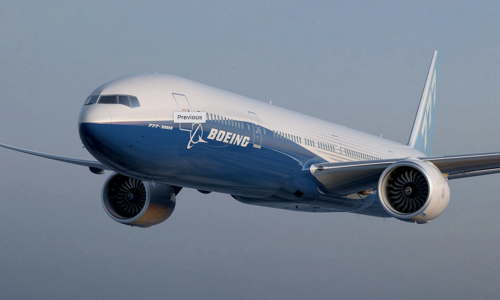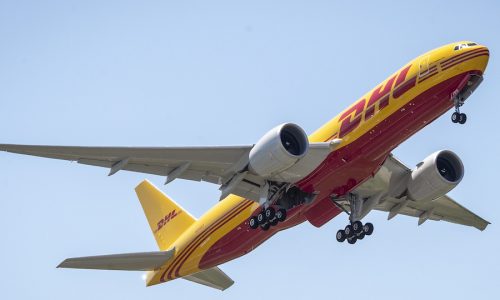Emirates has operated its first milestone demonstration flight on a Boeing 777-300ER, powering one of its engines with 100% Sustainable Aviation Fuel (SAF). The flight took off from Dubai International Airport (DXB), flying for more than one hour over the Dubai coastline.
Emirates’ demonstration flight, the first in the Middle East and North Africa to be powered by 100% SAF, supports broader efforts to reduce lifecycle CO2 emissions as the industry looks to scale up its use of SAF.
The flights will also help to refine the playbook for future SAF demonstrations, and will also support future certification where 100% drop-in SAF fuel is approved for aircraft. Currently, SAF is approved for use in all aircraft, but only in blends of up to 50% with conventional jet fuel.
Emirates worked alongside partners GE Aerospace, Boeing, Honeywell, Neste and Virent to procure and develop a blend of SAF that closely replicates the properties of conventional jet fuel.
At each blend ratio, a host of chemical and physical fuel property measurements were carried out. After multiple lab tests and rigorous trials, they arrived at a blending ratio that mirrored the qualities of jet fuel.
Eighteen tonnes of SAF were blended, comprised of HEFA-SPK provided by Neste (hydro processed esters and fatty acids and synthetic paraffinic kerosene) and HDO-SAK from Virent (hydro deoxygenated synthetic aromatic kerosene). The 100% SAF supplied one GE90 engine, with conventional jet fuel supplying the other engine.
The test flight further demonstrates the compatibility of the specially blended SAF as a safe and reliable fuel source.
The promising outcome of this initiative also adds to the body of industry data and research around SAF blends in higher proportions, paving the way for standardization and future approval of 100% drop-in SAF as a replacement for jet fuel, well above the current 50% blend limit.
Adel Al Redha, Chief Operating Officer, Emirates Airline said: “This flight is a milestone moment for Emirates and a positive step for our industry as we work collectively to address one of our biggest challenges – reducing our carbon footprint. It has been a long journey to finally see this demonstration 100% SAF flight take off.
“Emirates is the first passenger airline in the world to operate a Boeing 777 powering a GE engine with 100% SAF. Such initiatives are critical contributors to industry knowledge on SAF, and provide data to demonstrate the use of higher blends of SAF for future regulatory approvals.
“We hope that landmark demonstrations flights like this one, will help open the door to scale up the SAF supply chain and make it more available and accessible across geographies, and most importantly, affordable for broader industry adoption in the future.”
Said Omar Arekat, Vice President, Commercial Sales and Marketing, Middle East, The Boeing Company: “SAF will play a critical role in the aviation industry’s commitment to be net zero by 2050, requiring strong industry collaboration. We were proud to partner with Emirates on these tests and look forward to further working with our partners to enable the widespread use of SAF across the globe.”
Said Mosab Alkubaisy, Director of Airlines, Honeywell Aerospace Middle East: “We are excited to apply our technology to such a milestone demonstration. The 331-500 auxiliary power unit or APU is an integral part of the Boeing 777 aircraft system.
“The APU provides main engine starting, environmental control and emergency back-up systems for the aircraft on the ground and in-flight. It uses the same fuel as the main propulsion engines. Currently the APU is certified to run on only 50% SAF, so this demonstration is a big first step in showing full APU functionality and capability when running on 100% SAF.”
Jonathan Wood, Vice President EMEA, Renewable Aviation at Neste, said: “Neste is working closely together with partners to accelerate the availability and use of SAF, which plays a crucial role in reducing the emissions of air travel. To fully leverage its decarbonization potential we need to enable 100% SAF use and test flights like this Emirates flight are an important step towards 100% SAF certification.
“It also shows the importance of cooperation to achieve the emission reduction goals and Neste is committed to play our part in ensuring Dubai and the UAE continue to be a leader on sustainability and emission reductions in the aviation sector, as we increase our SAF production capacity to 1.5 million tons per annum by the end of this year. We look forward to growing the supply of SAF to Dubai.”
Said Dave Kettner, president and general counsel of Virent: “Virent’s technology converts widely available, plant-based sugars into the compounds that make 100% sustainable aviation fuel possible, without the need to blend with traditional jet fuel.”
Emirates’ first flight powered by SAF blended with jet fuel was in 2017, operating from Chicago O’Hare airport on a Boeing 777. It received its first SAF-powered A380 delivery in 2020, and also uplifted 32 tonnes of SAF for its flights from Stockholm that same year.

